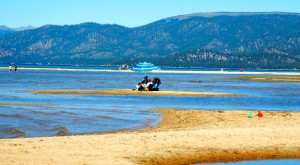As drought persists, frustration mounts over secrecy of California’s well drilling logs
By Tom Knudson, Sacramento Bee
Inside a government warehouse along a noisy freeway in West Sacramento is a set of metal shelves holding more than 100 carefully labeled cardboard boxes.
Inside those boxes are tens of thousands of state records that could help scientists and water policy specialists better understand and protect California groundwater.
But while all other Western states make such records – known as well completion reports, or well logs, for short – open to the public, California does not.

Lake Tahoe is so low sand bars are being created at Cove East on the South Shore. Photo/Kathryn Reed
Here, access to the documents is restricted. While some government agencies and researchers can view them, many scientists and the public at large cannot, a barrier many say reins in knowledge about groundwater supplies as the state struggles with one of the worst droughts in recorded history.
“We’re basically blindfolding ourselves,” said Laurel Firestone, co-director of the Community Water Center, a Visalia-based nonprofit, who argues that access to the records could help improve water quality. “If California is going to be serious about managing its groundwater, it can’t possibly do that without accessible and transparent data.”
By now, the contours of California’s groundwater crisis are familiar: the dried-up wells, sinking farmland, over-tapped aquifers and growing push for more state oversight. But on the edges of that drama is a back story that’s been largely overlooked about groundwater data, government secrecy and scientific opportunities lost.
Groundwater is critical to California. Without it, agriculture collapses, cities shrink, ecosystems die. Yet while our knowledge of rivers and reservoirs is exhaustive, we know far less about water stored inside the earth, including how much can be safely pumped without depleting aquifers and sowing long-term harm.
“Imagine trying to manage a reservoir where you’re not sure what the boundaries of the reservoir are. You’re not sure how much water gets in, how much water gets out, or what the level is,” said Graham Fogg, a professor of hydrogeology at UC Davis.
“Groundwater management is kind of like that,” Fogg said. “You are trying to manage systems that are ill-defined and ill-understood.”
Well completion reports help chart that underworld. Like medical charts, they are filled with data and notes that help researchers and water managers understand a complex system they can’t actually see.
In all other Western states, such records are accessible to whomever wants to see them – from university professors to civil engineers, real estate agents to the media. But in California, well logs are barred from public inspection by a 63-year-old law written to keep data gathered by well-drilling companies from falling into the hands of competitors.


